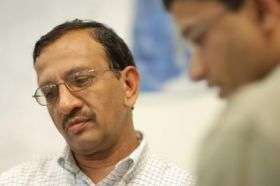Space is 'current frontier' for engineer working on next-gen wireless technologies

Bhaskar Rao is a space explorer, though he is no astronaut. The electrical engineer from UC San Diego’s Jacobs School of Engineering explores the “space frontier” that has opened up with the emergence of MIMO (multiple input multiple output) technologies for wireless communications. In MIMO systems, both transmitters and receivers contain multiple antennae, which means that space – and not just time – is in play when it comes to signal processing strategies for increasing data rates, reliability, users served, and other parameters in wireless communications networks.
MIMO approaches are expected to help advance wireless communication networks to the point that high-quality video and other high-data-rate content can flow across today’s wireless channels without increased power consumption or bandwidth usage – but only in areas where wireless channel conditions are right.
For his leadership in cutting edge areas of digital signal processing, Bhaskar Rao has been named the inaugural holder of the Ericsson Endowed Chair in Wireless Access Networks in the Jacobs School. This chair is part of Ericsson’s ongoing support of the UCSD division of the California Institute for Telecommunications and Information Technology (Calit2).
“Bhaskar has had a tremendous impact on the field of signal processing, especially in the areas of MIMO systems and speech processing. His work has both theoretical elegance and great commercial importance. The Ericsson Endowed Chair in Wireless Access Networks is a well deserved honor,” said Frieder Seible, Dean of the Jacobs School of Engineering at UCSD. “Bhaskar’s work is currently influencing the next generation of cell phones.”
Bhaskar Rao earned his doctorate from the University of Southern California in 1983 and joined the UCSD faculty that same year. Over his 25 years at UCSD, Rao has spent time at Qualcomm, Microsoft Research, AT&T Bell Labs and Stanford University in various research and consulting capacities. He is currently an active participant in UCSD’s Center for Wireless Communications and the UCSD division of Calit2.
“Bhaskar is a highly distinguished scholar with more than 200 journal and conference publications that span numerous aspects of signal processing, including digital signal processing, estimation theory, speech coding, multiple-antenna transmission, and space-time coding,” said Larry Larson, Chair and Professor in the Department of Electrical and Computer Engineering at UCSD’s Jacobs School of Engineering.
The 2008 Stephen O. Rice Prize Paper Award in the Field of Communications Systems was just awarded jointly to Bhaskar Rao, fellow electrical engineering professor Rene Cruz and Cruz’s Ph.D. student Bongyong Song, who is now at Qualcomm.
“The power of this work is that we did not restrict ourselves to just base-station-and-multi-user scenarios,” said Bhaskar Rao. Instead, this work encompasses arbitrary wireless networks consisting of heterogeneous types of communication devices.
The paper appeared in the March 2007 issue of IEEE Transactions on Communications.
In this award-winning research, the engineers designed a combination of transmission and reception algorithms that work together in order to find the jointly optimal communication strategy. The algorithms can be implemented either in a centralized or decentralized fashion. The decentralized strategy is very practical and performs almost as well as the centralized one.
Previous work from Rao’s group has already made its way out of the labs. Their ideas on the feedback that wireless receivers should send back to transmitters in MIMO environments have influenced new WiMax standards.
“Bhaskar’s work on multiple antenna systems is world renowned, and this is becoming an increasingly important aspect of wireless communication systems,” said Pam Cosman, electrical and computer engineering professor and director of UCSD’s Center for Wireless Communications. “Bhaskar is that rare professor who is admired equally as a researcher and as a teacher and mentor, with many prize paper awards as well as teaching awards.”
The new Ericsson Endowed Chair in Wireless Access Networks is the second endowed chair to be provided by Ericsson through its corporate commitment to the UCSD Division of Calit2. In 2005, Professor Laurence Milstein was awarded the Ericsson Endowed Chair in Wireless Communication Access Techniques. The Ericsson support does not stop there. In January 2007, Geoff Voelker and Rene Cruz – also professors at UC San Diego’s Jacobs School of Engineering and Calit2-affiliated researchers – were named Jacobs School Ericsson Distinguished Scholars. Ericsson has also been a supporter of UCSD’s Center for Wireless Communications.
“We appreciate Ericsson’s ongoing support for research at Calit2 and UCSD, including the faculty chairs and fellowships that make it possible for us to retain top-flight professors who are critical to our success,” said Ramesh Rao, director of the UCSD division of Calit2 who is also a professor of electrical and computer engineering in the Jacobs School. “Along with Ericsson, Calit2 has re-shaped the focus of its research agenda in digital signal processing to encompass new trends in this field, and Bhaskar Rao has played an important role in that shift through the direction of his own research and scholarship.”
Bhaskar Rao is no stranger to honors. He and members of his research group – The Digital Signal Processing Lab @ UCSD – have received six paper awards in the last eight years. In 2000, Bhaskar Rao was elected a Fellow of the IEEE for his work on the statistical analysis of subspace algorithms for harmonic retrieval. He also took home the Graduate Teaching Award for 1997-1998 from the Graduate Student Council from the Jacobs School’s Electrical and Computer Engineering department.
Source: University of California - San Diego





















